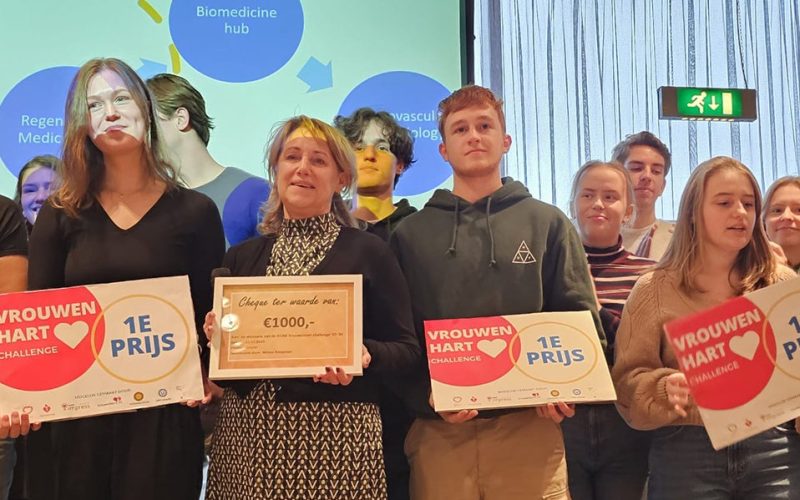Over a month ago, 400 students in FC Utrecht’s Galgenwaard stadium engaged in an educational challenge: who comes up with the best plan to take research into the rare heart disease SCAD a step further? Which students won the Women’s Heart Challenge and what was their winning idea?
Since the special kick-off of the Women’s Heart Challenge in the FC Utrecht stadium Galgenwaard, the more than 400 students of Medicine and Biomedical Sciences worked very hard for a month to find solutions in the research of SCAD, a disease that occurs mainly in young women. During the final symposium, again at this sporting venue, the students pitched their ideas in ten groups. Of all the proposals, three stood out, according to the jury of physicians, biomedical researchers and patients. The student groups had a translational proposal to use a combination of symptoms and signaling substances in the blood to estimate the risk of SCAD.
Why these students won the Women’s Heart Challenge? Hester den Ruijter, professor of cardiovascular disease in women at UMC Utrecht, tells us, “It’s great to see these students come up with innovative ideas that can have an immediate impact on the care of these women.”
Students will actually implement this idea later in the academic year during the elective course Experimental Translational Medicine. The research the students have come up with is interdisciplinary and will be conducted from different perspectives, namely from a biomedical laboratory (Bachelor Research Hub), Epidemiology, Regenerative Medicine and Medical Humanities. To facilitate this, a new “Student Research Hub network” has been established at UMC Utrecht. This promotes interdisciplinary collaboration and learning.
With the completion of this second edition, the education challenge has now become a permanent part of the regular education program within the Faculty of Medicine of the UMC Utrecht; students receive credits for it. That the challenge will take place again next year is a fact. And the subject? You will hear soon!
SCAD (Spontaneous Coronary Artery Dissection) is a rare heart disease. It occurs mostly in young women without risk factors for cardiovascular disease and can lead to a life-threatening myocardial infarction.
